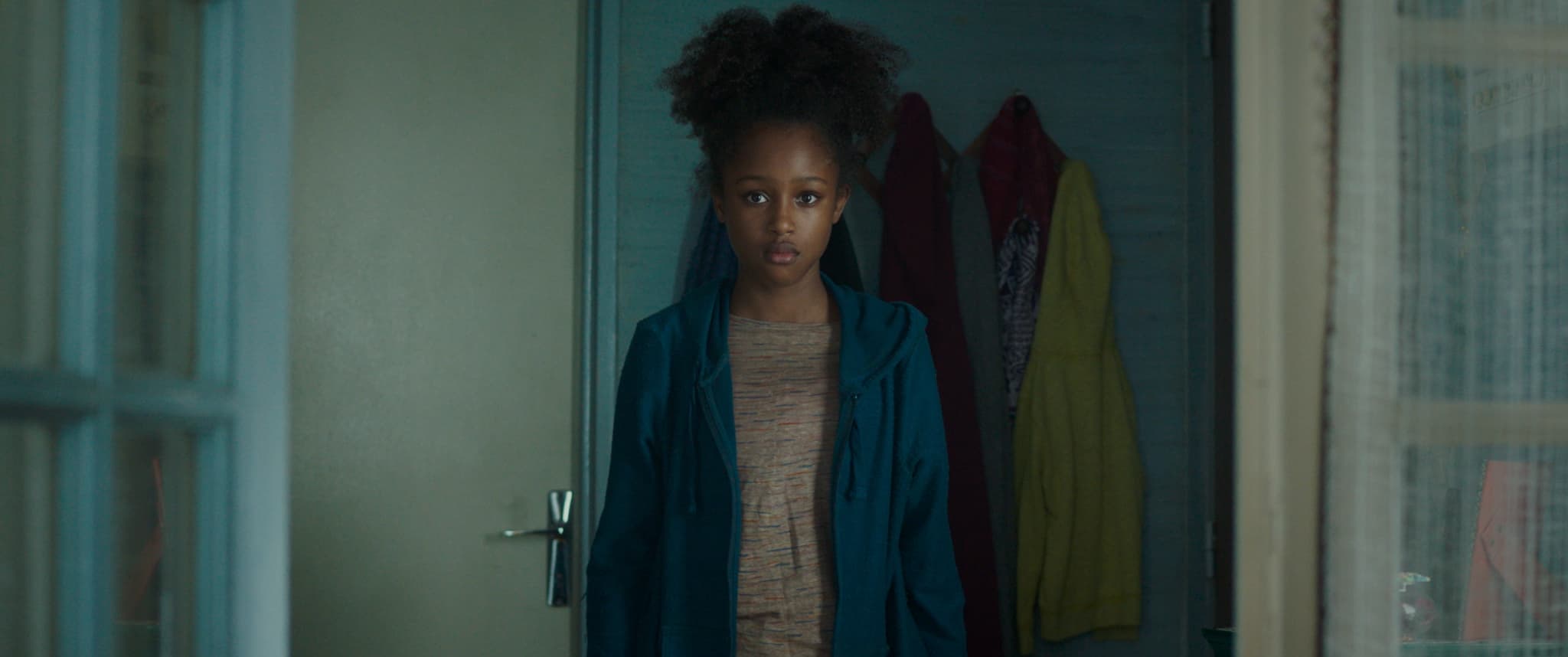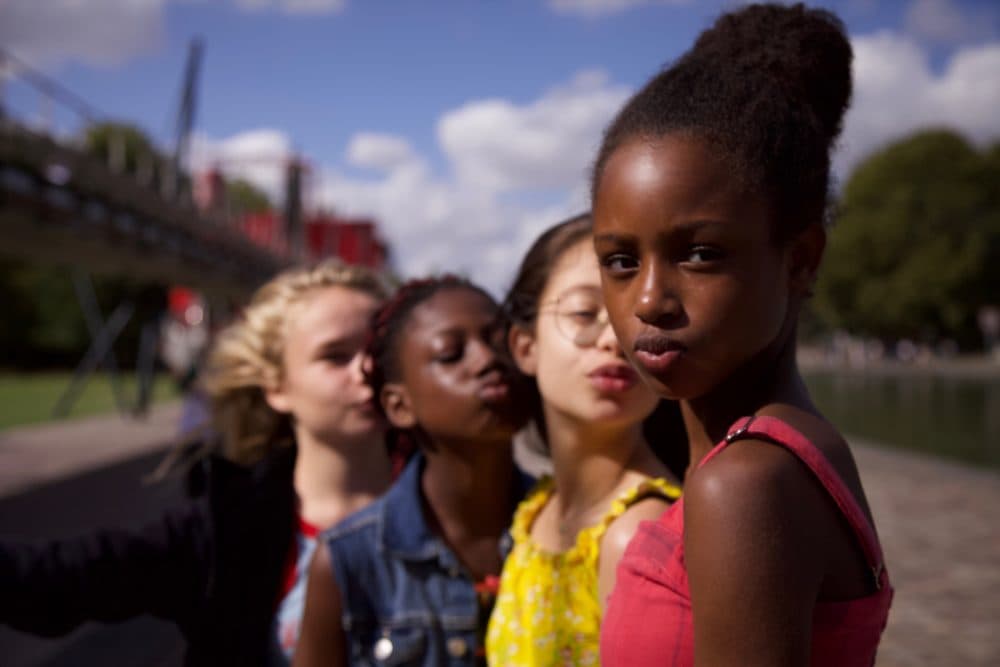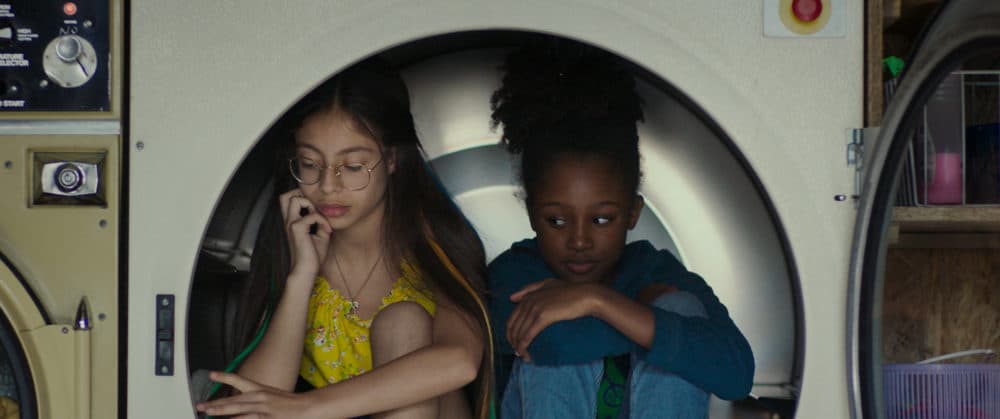Advertisement
Review
Despite What You May Have Heard, Film 'Cuties' Is A Thoughtful Exploration Of Adolescent Pressures

You probably didn’t hear much about “Cuties” when Maïmouna Doucouré won Best Director in the World Cinema Dramatic competition at this past January’s Sundance Film Festival. I didn’t, and I was there. (Despite recent diversity initiatives, the festival’s attention remains mostly focused on American indies in the main competition, with foreign language films still exiled to sidebar categories.) Too bad, because it’s quite an accomplished debut, inspired by the director’s own experiences growing up poor in Paris as the daughter of Senegalese immigrants.
The film follows an 11-year-old Muslim girl who falls in with a fast crowd, acting out and pushing back against her strict, religious upbringing. It’s a thoughtful exploration of adolescent pressures in a hypersexualized society. But chances are if you’ve read anything about “Cuties” lately, it’s been for entirely different reasons.
The film — which starts streaming on Netflix Sept 9 — takes its title from a troupe of tween dancers who confound their elders with queasy routines full of twerking, hair-flips and other suggestive stuff that’s these days only socially acceptable during a Super Bowl halftime show. Their climactic performance is deliberately disconcerting and (spoiler) ends in tears, like if the finale of “Little Miss Sunshine” had been played for horror instead of laughs. A couple of weeks ago, Netflix rather stupidly used a still from this scene — with the scantily clad girls striking sultry poses — as the basis of a promotional poster, bringing down a rain of hellfire from all corners of the internet that resulted in death threats for the director and targeted harassment campaigns against defenders of the film. The streaming service quickly apologized and modified their marketing, to little avail. Once outrage goes viral like this, you can’t put the toothpaste back in the tube top.

“The only motivation of those who would produce such a film as ‘Cuties’ is to sexualize children and to fuel the appetites of those who would feed on the sexualization of children,” says a statement from something called the Parents Television Council. A Change.org petition originally demanding that the movie be removed from the streaming service on which it had not yet premiered (the text has since been amended) garnered over 600,000 signatures. Sight unseen, “Cuties” has become the bête noire of countless QAnon types and like-minded keyboard crusaders in our current Satanic Panic 2.0 of lunatic conspiracy theories about child sex trafficking rings, with its Black, female, French Senegalese director frequently referred to as “another Hollywood pedo.” (It’s getting pretty crazy out there, folks. Last month a lovely acquaintance I’d always assumed was sane started insisting on Facebook that Tom Hanks became a Greek citizen to escape prosecution for his role in Pizzagate.)
I’m reasonably sure that most of these folks who are so angry about a movie they haven’t even watched would never willingly sit through a subtitled film in the first place — especially one featuring so many cast members of color. And that’s an awful shame because, despite some slight missteps we’ll get to later, “Cuties” is a serious film that inspires conversations we really should be having right now about the world in which our young girls are growing up. It’s refreshingly frank about class, religion and burgeoning sexuality in ways mainstream American movies would never dare. And who can blame them, given all that’s happened to this one over the past couple weeks? (It probably goes without saying that “Cuties” opened in France last month to wide acclaim and zero controversy.)
Fathia Youssouf Abdillahi stars as young Amy Diop, who recently moved to a Parisian housing project with her mother and two baby brothers. The master bedroom has been locked off because her father has taken a second wife in Senegal, who will soon be arriving for a lavish marriage ceremony, banishing Amy’s mom to one of the children’s rooms. Life is stifling in this tiny apartment. Doucouré shoots in widescreen cinemascope but cramps the characters into frames-within-frames, always walled off by obstructed views through doorways and windows. Then one day, downstairs in the laundry room, Amy discovers freedom. Well actually, it’s just Angelica (Medina El Aidi), a bespectacled dynamo dancing up a storm while ironing her hair. It's the first shot in the movie in which there’s any room to breathe, and Angelica spins and flings her way around every inch of it.
Advertisement

Most of the movie chronicles Amy’s attempts to curry favor with Angelica and her gang of so-called Cuties — back-sassing bad girls who strike freeze-frame flash mobs in the schoolyard to drive their teachers crazy and shake their groove things around the projects all afternoon. They talk dirty without really knowing what they’re talking about — one of the less worldly gals mistakes a condom for a balloon and blows it up — pretending to be precocious according to whatever they’ve seen most recently on social media. Amy knows this is all raunchy and wrong yet it feels so invigorating and alive compared to the dutiful drudgery in which her mother and miserable aunt toil subserviently, every choice already made for them by men we never meet.
“When I was your age I was already engaged,” scolds Amy’s old-world auntie, who in a sly bit of casting is played by Mbissine Thérèse Diop, star of Ousmane Sembène’s seminal 1966 “Black Girl.” Our heroine swipes her older male cousin’s cell phone, and before long she’s taking duckface selfies in the moonlight, intoxicated by the attention of strangers online. It’s here that Doucouré begins to tread on tricky ground with, I think, extraordinary sensitivity. Amy starts wearing one of her little brother’s T-shirts as a crop-top, and the movie quite delicately toggles between her newfound empowerment at finally being looked at by boys and the shame she feels after being objectified. Sexuality can be a scary, complicated thing when you’re young and it’s only gotten a thousand times messier thanks to the internet. “Cuties” could easily have become either a cautionary afterschool special or an irreverent, anti-religious screed, but instead it’s a rare movie that understands the profound ambivalence of adolescence. Liberation brings its own discontents, and power balances are always in flux.
Sometimes it stumbles. Doucouré includes a strange, magic realist tangent in which the traditional formal dress Amy’s supposed to wear at her father’s wedding seems to be endowed with supernatural powers, occasionally knocking on the closet door to interrupt conversations, and its fabric appears to start menstruating when she does. (Nope. No idea.) The final shot is a great way to end a movie but I’m not sure it’s a great way to end this movie, considering all that’s come before. Yet for every such slip, there’s a wonderful scene like one in which Amy — having recently been ridiculed by her friends for having a “flat butt” — hides under her hijab during a prayer service, surreptitiously watching a tawdry twerking video on her phone. Afterward, she studies the well-rounded rear ends of her mother and the other women at the mosque, a knowing smile spreading wide across her face.
The film actually has a lot in common with last summer’s uproarious “Good Boys,” a sort of “Superbad” junior about three naive sixth-graders bluffing their way through assorted adult situations. The R-rated comedy was a modest hit without inspiring much in the way of condemnation, probably in part because they’re boys, and it feels like there's less at stake than there is in “Cuties.” Doucouré is asking us to think long and hard about the kind of behavior our young girls are being taught to emulate, and who they’re really performing for. But these are tough conversations I worry a lot of people won't want to have right now, especially when it's so much easier to just judge a film by its poster.
“Cuties” starts streaming on Netflix this Wednesday, Sept. 9.
